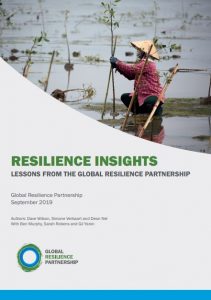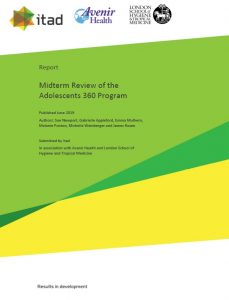Itad has produced a range of publications in 2019, from project reports to learning notes and interactive microsites. With an aim to make sure that the evidence we built on what works, why and for whom in international development is as useful and useable as possible, we are always looking for new ways to publish and share our findings – the below list showcases some of our highlights from the last year.
 We designed and built an interactive microsite for The Global Resilience Partnership (GRP), a partnership of public and private organisations joining forces towards a resilient, sustainable and prosperous future for vulnerable people and places in an increasingly unpredictable world. The microsite builds on the GRP Insights Report, which was launched together with the site in September 2019 and explores the latest evidence on how resilience approaches are helping some of the world’s poorest and most vulnerable people to move from protracted and recurrent crises to longer-term sustainable development. The evidence will be used to inform future resilience programming at a time when it is more important than ever.
We designed and built an interactive microsite for The Global Resilience Partnership (GRP), a partnership of public and private organisations joining forces towards a resilient, sustainable and prosperous future for vulnerable people and places in an increasingly unpredictable world. The microsite builds on the GRP Insights Report, which was launched together with the site in September 2019 and explores the latest evidence on how resilience approaches are helping some of the world’s poorest and most vulnerable people to move from protracted and recurrent crises to longer-term sustainable development. The evidence will be used to inform future resilience programming at a time when it is more important than ever.
The A360 project aims to increase adolescent girls’ access to and demand for modern contraception in developing countries. The Midterm Review of the Adolescents 360 Program, published in June 2019, summarises in an infographic the evaluation findings from the design phase of A360, concluding that, while it is too early to determine the effectiveness of the solutions, the value of the A360 approach is starting to emerge. It also highlights some challenges and trade-offs ahead.
We also completed an evaluation of the first market system programme in Nepal for DFID. The Samarth Programme worked with a national dairy processor to upgrade processing facilities and expand the milk collection of a local cheese producer. In turn, the local producer worked with smallholder farmers to improve milk productivity and quality through improved husbandry practices. We published an engaging Learning Note titled ‘Does market development work in Nepal?’ synthesising our findings.
The Learning from mapping MLE capacity for advocacy briefing note, published in July 2019, explores how Itad’s ‘Adaptive MEL for Advocacy’ approach gave us a framework to help partners see MEL in a more integrated way, as well as a way of mapping what organisations were already doing in terms of Monitoring, Evaluation and Learning (MEL).
As we move into 2020, we’ll continue to explore new ways to share our work so watch this space!

